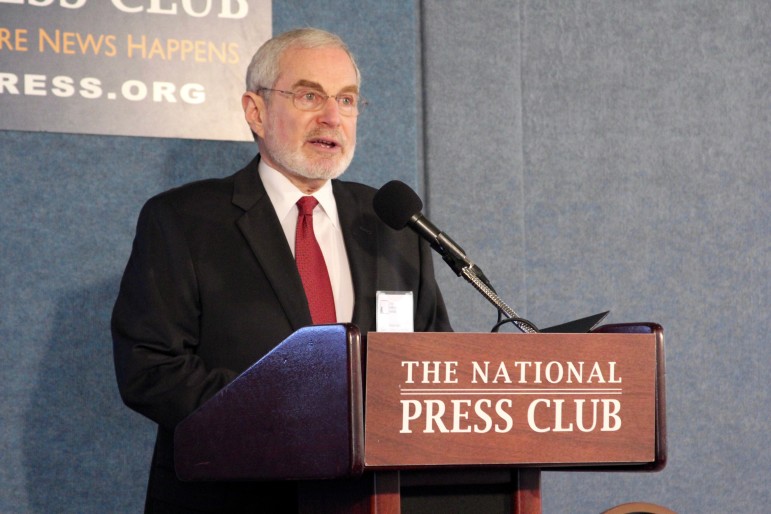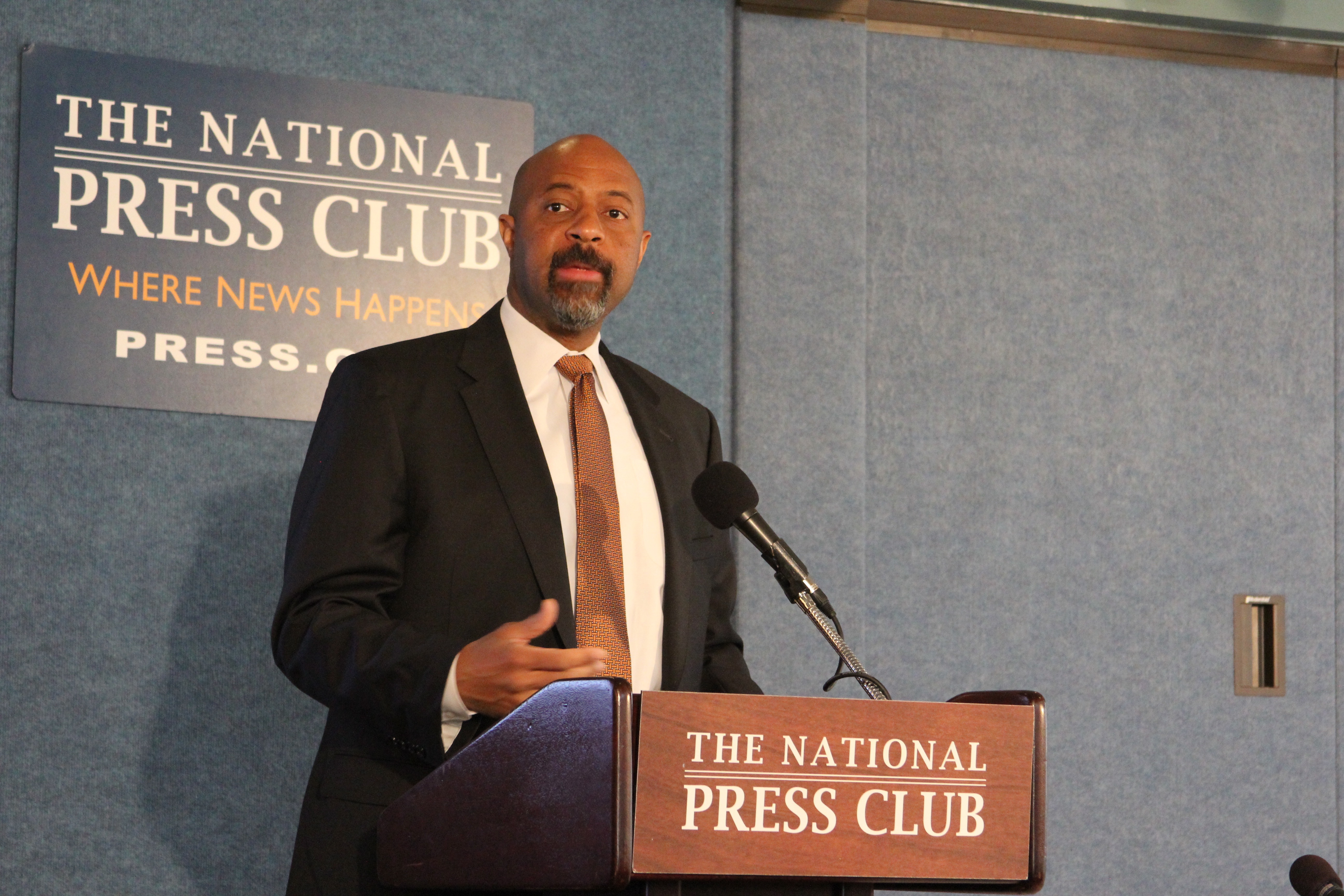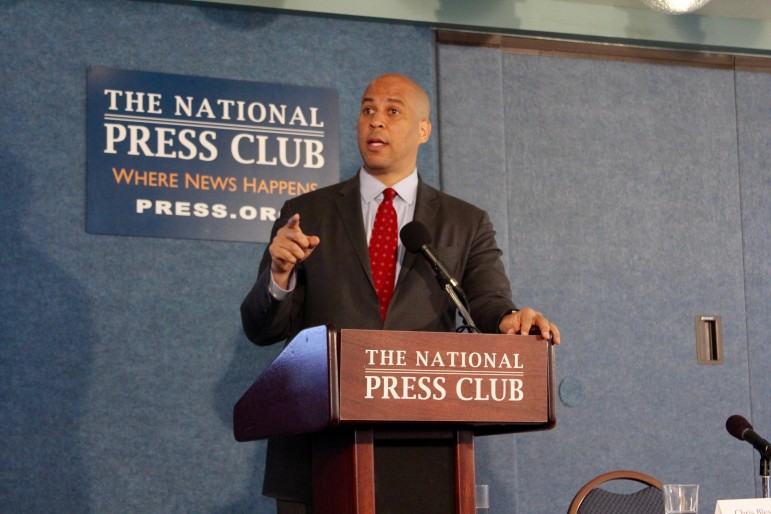
Sarah Barr
Mark Soler, executive director of the Center for Children’s Law and Policy.
WASHINGTON — A campaign to end solitary confinement for juveniles launched today, with supporters pledging to build on the momentum of leading-edge jurisdictions that have banned the practice.
The Stop Solitary for Kids campaign will offer technical assistance, training, public education, and model policy and legislation at the local, state and federal levels, all aimed at ending the use of solitary confinement for juveniles.
“We want to reach a tipping point where there is so much momentum that it becomes the professional standard,” said Mark Soler, executive director of the Center for Children’s Law and Policy.
Researchers have found solitary confinement can cause depression, anxiety and psychosis; children and teenagers are especially at risk because they are still developing. More than half of all suicides in juvenile facilities occurred while young people were held in isolation.
The growing concern about the effects of solitary has spurred action to end the use of solitary among states, including Indiana, Ohio, Massachusetts, Oregon and Mississippi, as well as at the federal level.
The campaign — a partnership between CCLP, the Council of Juvenile Correctional Administrators, the Center for Juvenile Justice Reform and the Justice Policy Institute — will highlight existing strategies to end solitary developed by groups such as the Juvenile Detention Alternatives Initiative, a project of the Annie E. Casey Foundation.
“This is doable. This is not pie in the sky,” Soler said.
The groups involved in the campaign said juveniles should only be confined to their room when they pose an immediate threat to themselves or others, and then only temporarily until they can return to regular programming.
In 2012, 44 percent of detention centers reported they had locked youth in a room for more than four hours in the past month, according to an analysis of federal data by the National Center for Juvenile Justice.
State experience
State administrators who have successfully ended the use of solitary confinement said support from correctional officers is key to changing policies because they need to feel they can safely diffuse situations.
Building that support requires sharing data about the use of solitary and how it is affecting juveniles, offering training and providing alternatives for officers to use to correct misbehavior, said Christine Blessinger, director of the division of youth services at the Indiana Department of Corrections.
[Related: Stop Solitary for Kids]
“If you don’t have the alternatives, you’ll never get the staff buy-in because they’ll say, ‘What else are we going to do?’” she said.
Linda Janes, assistant director of the Ohio Department of Youth Services, said the state has seen an 89 percent reduction in the use of seclusion since officials decided to shift policies two years ago. At the same time, violence has decreased by 22 percent.
“Not only is it possible, but I would say it’s imperative for everyone in the juvenile justice arena. We’ve seen fantastic results,” she said.
Federal action
The federal government also has taken action on the use of solitary confinement for juveniles.
President Obama announced in January that the federal government would not place juveniles in isolation. While fewer than 100 juveniles were in federal custody at the time of the announcement, reformers hailed the decision as a potential springboard for action in counties and states, where most juveniles are held.
Robert Listenbee, administrator of the Office of Juvenile Justice and Delinquency Prevention at the Department of Justice, said his office encourages states to follow the department’s position on solitary confinement and supports states’ efforts to develop alternatives.
“We know that too often solitary confinement is used to punish a child, to avoid behavioral or mental health issues,” he said.

Sarah Barr
Roy Austin, deputy assistant to the president for the Office of Urban Affairs, Justice and Opportunity
In addition, Roy Austin, deputy assistant to the president for the Office of Urban Affairs, Justice and Opportunity, said the federal move to end the use of isolation was “just the start.” Policymakers also should be paying attention to school discipline, raising the age of juvenile jurisdiction and better services inside facilities.
“At every step we have to do better by our kids. We have to start by getting them out of the system in the first place,” he said.

Sarah Barr
Sen. Cory Booker
Sen. Cory Booker, D-New Jersey, who has pushed to include restrictions on solitary confinement for juveniles in criminal justice reform legislation, said the federal order was critical but noted a future president could reverse it. Federal lawmakers also should take action to point the ways for states and ensure the policy continues.
“We here in Washington should be able to do something that is permanent and reflective of our values,” he said.
A proposed reauthorization of the Juvenile Justice Delinquency and Prevention Act, S. 1169, would require states to gather data on how isolation is used, and how frequently, and to promote methods for minimizing isolation.
The Senate Judiciary Committee approved the legislation last July, but it stalled on the Senate floor in February when Sen. Tom Cotton, R-Arkansas, objected to a provision that would limit judges’ ability to send juveniles to lockup for status offenses.
More related articles:
Solitary Confinement: Traumatising But Useless
Solitary Reform Shows Power of Brain Science to Change Policy
It’s Time to Rethink Solitary Confinement for Juveniles in State Prisons and Jails
If these law makers focus on stopping the problem before it starts there wouldn’t be all these debates and jaw jabbing. The money and energy should be going to early intervention. The need is to teach these parents how to be parents , for cops to do their job and stop harassing kids, get these racist Judges off the bench, get these laze bias teacher out of the classes and to much intrusion by child protection service. Child protection services has taken the authority from the parents and given the power to the children.
Stop with the status quo , and reinventing the wheel. Think outside the box, these kids can be saved but by people that really understand these children not a bunch of individuals with ABC’s after their name that never wanted for nothing their entire lives.
I’ve been in Juvenile 9 times and in solitary confinement I think this is great move forward and out of the lonely cage. Mark Soler.
Thank You,
Cindy De Losa